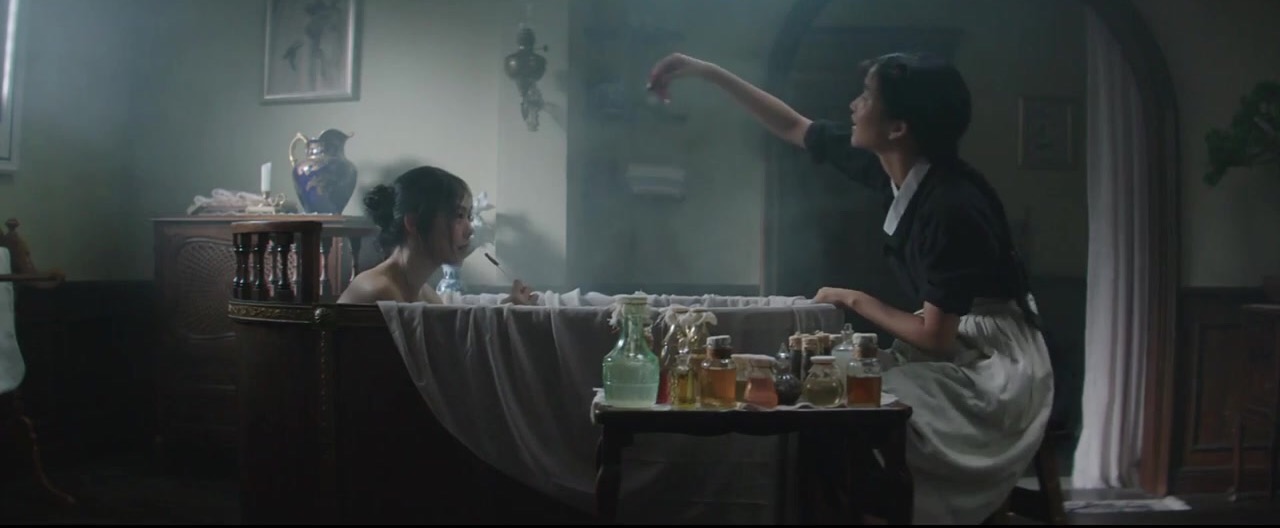
Park Chan-wook is not exactly unfamiliar with the con man narrative – his two most famous films in America, Oldboy and Stoker, both revolve around hidden plots the protagonists are trying to untangle. In The Handmaiden, however, he is more directly engaging with the tropes of the genre. There are plots and double-crosses and unreliable narrators and massive amounts of plot skillfully slid just out of or just into the audience’s view. The pure pleasure of watching The Handmaiden is not dissimilar from the machinations of an Oceans film or any other such heist, which indeed, in a sense, this is. There’s a loot of money that must be had and a definite plan for how to get it. What makes it a great film, beyond Park’s characteristic directorial rigor and downright strange taste, is the way he twists the heist plot into something personal, and recognizes that the money doesn’t buy success or comfort – it buys freedom.
The film’s opening shot is all to do with freedom. In 1930s Japan-occupied Korea, troops march through a frightened village. We soon meet Sook-hee (Kim Tae-ri, in her feature debut), a young, poor woman who’s landed the comparatively-enviable position of handmaiden to a wealthy Japanese heiress (Kim Min-hee), shut away in a lavish mountain far out of town. Sook-hee will benefit little from this luxury. She’s quartered in a converted closet immediately outside Lady Hideko’s bedroom so that she may attend to her every whim; no matter how small, no matter what hour. But Sook-hee isn’t there hoping to work her way up the ladder to head maid or anything of the sort. Her cousin, Count Fujiwara (Ha Jung-woo), has set her up there to slowly convince the mistress to marry him so that he may shut her away in an asylum and enjoy all she has and will have. But Sook-hee is young, filled with ambition, and starts to develop a plot of her own.
As with any con man film, to give away any more would be unthinkable. I found much of my first viewing enamored with the details and genius of its plotting. Adapted from Sarah Waters’ 2002 Victorian novel Fingersmith, Park and cowriter Chung Seo-kyung have masterfully translated it to a more local setting. The dialogue, which alternates between Japanese and Korean, is helpfully color-coded in the English subtitling, and the viewer intuitively makes the distinction without much consideration almost immediately. Language is a sort of power – the ability to read plays a role as well – and whether a character chooses to speak in one tongue or another in a given situation speaks volume of his or her position in the narrative. But the real fun of the setting is Park’s perspective on it. Probably a good deal unrealistic and steeped in pulp, no element of his story is safe from overt sexuality or obsessive set decoration. The opportunity to go room to room with all the comforts money of its era can buy is one Park relishes.
But the luxury, the kink, the hedonism has its prisoners. When we meet her, Hideko seems barely able to keep herself alive, much less think independently outside of the rigorous upbringing her uncle (Cho Jin-woong) has designed. She has all the money in the world, but absolutely no freedom. The possibility that her isolation is driving her to madness does not seem beyond reason. Sook-hee being the only woman her age nearby, and nearby so often, gives even her subtle suggestions enormous influence.
Gradually, the film considers more and more the lonely lives these women lead, forever at the behest of male family (Hideko’s uncle, Sook-hee’s cousin). It uses the con man structure to explore how little we truly know about anyone, what secrets are buried beneath the roles they must play in daily life, and the difficulty of breaking through to anything real and intimate. Kim Min-hee has to whittle away at layers of Hideko’s psychology bit by bit, toying with what the audience knows about her, what Sook-hee knows about her, what her family knows about her, and what she knows at herself. Especially when seen a second time, it’s a fascinating nesting-doll performance that must respond to (and possibly manipulate) her seemingly-naive servant. This at first seems an easy task. Sook-hee’s instructed phrases became a template for how much of our public personas are built on refrains we hear from others, a sense that if one says the words that seemed to hold such power, we too might attain it. As she alternates loyalty between Fujiwara, Hideko, and to a certain extent herself, we see her twist dialogue the others have said against them, which Kim Tae-ri plays with astonishing confidence. She renders a young, inexperienced, impulsive character without a hint of those qualities herself as an actress.
“Art house thriller” is usually code for “totally banal crime film that happens to be in a foreign language,” but with The Handmaiden, Park Chan-wook has invested this pulpy entertainment with real heart and insight into the thrill and uncertainty of new relationships. This isn’t to say it makes it “more than a thriller”, as if there’s anything wrong with that, but rather, like the best genre storytellers, Park recognizes what makes genre tropes so compelling – they transform some common emotional experiences into unimaginable adventures. Without abandoning the rigor of his narrative, Park finds humanity. The Handmaiden is a blast, but it lingers long past the point when most such thrills have vanished.



